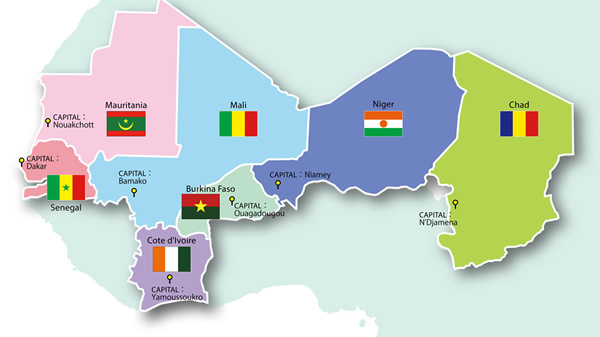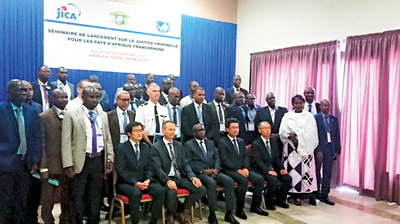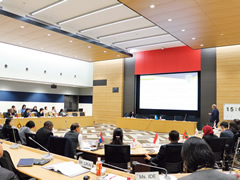Feature
Ensuring Basic Human Rights
Developing Legal and Judicial Systems to Protect Rights
[Case 1] Learning about Criminal Justice in Japan

Seven Francophone African Countries Working Together
Improving criminal justice practices that seek to realize a society where justice and human rights are protected.
Training to Enhance Capabilities
Criminal justice aims to secure the safety of citizens by bringing to light the truth in cases through investigation and trial with proper procedures, and imposing appropriate punishment in accordance with criminal law. To achieve a society where everyone can live in peace, police, prosecutors, and judges should each act according to their designated roles, and at times work together so that the criminal justice system functions effectively. However, in some countries, the system does not function well, even though there are laws and systems in place.
In order to improve this situation, JICA has partnered with the United Nations Asia and the Far East Institute for the Prevention of Crime and the Treatment of Offenders (UNAFEI). UNAFEI was jointly created by the UN and Japan, to carry out a range of training over a five-to-six week period for those engaged in work related to criminal justice. These courses are designed for police, judges, prosecutors, prison staff, and probation officers in developing countries. More than 200 such training courses have been held since the first course in 1962, and there are now as many as 6,000 alumni in 139 countries.
The training courses cover: the Criminal Justice (Focus on Investigation, Prosecution, Adjudication, and International Cooperation) training course; Treatment of Offenders (Focus on Prison, Probation and Parole) training course; the Crime Prevention and Criminal Justice (Senior Officials' Seminar) training course; and the Criminal Justice Response to Corruption training course. Course programs include: presentations by participants about the crime situation and criminal justice system in their respective countries; lectures by national and international specialists; on-site visits, including visits to criminal justice-related institutions; and group workshops and discussions where participants can exchange opinions about a designated theme.

Trainees gathered together for the kick-off seminar.
Francophone Africa: Creating Cross-Border Relationships
JICA also carries out country-specific training to enhance the abilities of personnel in certain areas of criminal justice in a specific country or region to support resolving issues. For example, with the cooperation of UNAFEI, JICA carried out training for francophone African countries with problems in the area of criminal justice over the period from fiscal 2013 to 2017. From a long-term perspective, conducting ongoing training is necessary to improve practices relating to everything from investigation to trial. Criminal justice training is once again scheduled for fiscal 2020. A kick-off seminar was held in Côte d'Ivoire in January 2020 ahead of the commencement of full-scale training. In addition to Côte d'Ivoire, participating countries include Burkina Faso, Chad, Mali, Mauritania, Niger, and Senegal. "In recent years, the need for international cooperation in investigations has increased along with frequency of instances of transnational crime, such as terrorism. Therefore, being able to learn about and understand each other's methods of investigation and build networks is very helpful." (Police Officer); "Receiving training together with the judicial police enables us to understand how investigations are carried out and how evidence is collected. This understanding is useful when it comes to handling evidence in trials." (Trial Judge); With participant feedback such as these, it is clear that they understand the significance of cross-disciplinary training between these seven countries that share common borders.

A scene from the crime prevention and criminal justice (senior officials' seminar) training held in January - February 2019. Personnel involved in criminal justice were gathered from 17 countries, including the Dominican Republic, Laos, Thailand, and Japan.
Full-scale training will commence shortly. Training will focus on improving the practice of criminal justice from investigation to trial. It will concentrate on areas such as cooperating in investigations and administering justice in transnational crime cases, such as organized crime, terrorism, drug-related crime, and human trafficking. When this training is completed, it is envisaged that tangible progress in the practice of criminal justice will have improved people's trust in judicial institutions. Additionally, there will be strengthened collaboration among criminal justice institutions in the area within five years.




scroll